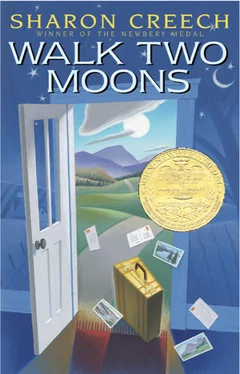They were married three months later. During that time between his proposal and their wedding day, Gramps and his father and brothers built a small house in the clearing behind the first meadow. “We didn’t have time,” Gramps said, “to completely finish it, and there wasn’t a single stick of furniture in it yet, but that didn’t matter. We were going to sleep there on our wedding night all the same.”
They were married in an aspen grove on a clear July day, and afterward they and all their friends and relatives had a wedding supper on the banks of the river. During the supper, Gramps noticed that his father and two of his brothers were absent. He thought maybe they were planning a wet cheer, which is when the men kidnap the groom for an hour or so and they all go out to the woods and share a bottle of whiskey. Before the end of the supper his father and brothers came back, but they did not kidnap him for a wet cheer. Gramps was just as glad, he said, because he needed his wits about him that evening.
At the end of the supper, Gramps picked up Gram in his arms and carried her across the meadow. Behind them, everyone was singing, “Oh meet me, in the tulips, when the tulips do blooom—” This is what they always sing at weddings when the married couple leaves. It is supposed to be a joke, as if Gram and Gramps were going away by themselves and might not reappear until the following spring when the tulips were in bloom.
Gramps carried Gram all the way across the meadow and through the trees and into the clearing where their little house stood. He carried her in through the door, and took one look around and started to cry.
The reason Gramps cried when he carried Gram into the house was that there, in the center of the bedroom, stood his own parents’ bed—the bed that Gramps and each of his brothers had been born in, the bed his parents had always slept in. This was where his father and brothers had disappeared to during the wedding supper. They had been moving the bed into Gram and Gramps’s new house. At the foot of the bed, wiggling and slurping, was Sadie, Gramps’s old beagle dog.
Gramps always ends this story by saying, “That bed has been around my whole entire life, and I’m going to die in that bed, and then that bed will know everything there is to know about me.”
So each night on our trip out to Idaho, Gramps patted the bed in the motel and said, “Well, this ain’t our marriage bed, but it will do,” while I lay in the next bed wondering if I would ever have a marriage bed like theirs.
It was time to tell Gram and Gramps about Mr. Birkway.
Mr. Birkway was mighty strange. I didn’t know what to make of him. I thought he might have a few squirrels in the attic of his brain. He was one of those energetic teachers who loved his subject half to death and leaped about the room dramatically, waving his arms and clutching his chest and whomping people on the back.
He said, “Brilliant!” and “Wonderful!” and “Terrific!” He was tall and slim, and his bushy black hair made him look wild, but he had enormous deep brown cowlike eyes that sparkled all over the place, and when he turned these eyes on you, you felt as if his whole purpose in life was to stand there and listen to you, and you alone.
Midway through the first class, Mr. Birkway asked for everyone’s summer journals. He flung himself up and down the aisles, receiving the journals as if they were manna from heaven. “Wonderful!” he said to each journal-giver.
I was worried. I had no journal.
On top of Mary Lou Finney’s desk were six journals. Six. Mr. Birkway said, “Heavens. Mercy. Is it—can it be—Shakespeare?” He counted the journals. “Six! Brilliant! Magnificent!”
Christy and Megan, two girls who had their own club called the GGP (whatever that meant), were whispering over on the other side of the room and casting malevolent looks in Mary Lou’s direction. Mary Lou kept her hand on top of the journals as Mr. Birkway reached for them. In a low voice she said, “I don’t want you to read them.”
“What?” Mr. Birkway boomed. “Not read them?” The whole room was silent. Mr. Birkway scooped up Mary Lou’s journals before she could even blink. He said, “Don’t be silly. Brilliant! Thank you!”
Another girl, Beth Ann, looked as if she might cry. Phoebe was sending me messages with her eyebrows that indicated that she was not too pleased either. I think they were all hoping that Mr. Birkway was not actually going to read these journals.
Mr. Birkway went around the whole room snatching journals. Alex Cheevey’s journal was covered with basketball stickers. Christy’s and Megan’s were slathered over with pictures of male models. The cover of Ben’s was a cartoon of a boy with a normal boy’s head, but the arms and legs were pencils, and out of the tips of the hands and feet were dribbles of words.
When he got to Phoebe’s desk, Mr. Birkway lifted up her plain journal and peeked inside. Phoebe was trying to slide down in her chair. “I didn’t write much,” Phoebe said. “In fact, I can hardly remember what I wrote about at all.”
By the time Mr. Birkway got to me, my heart was clobbering around so hard I thought it might leap straight out of my chest. “Deprived child,” he said. “You didn’t have a chance to write a journal.”
“I’m new—”
“New? How blessed,” he said. “There’s nothing in this whole wide world that is better than a new person!”
“So I didn’t know about the journals—”
“Not to worry!” Mr. Birkway said. “I’ll think of something.”
I wasn’t sure what that meant. I thought maybe he would give me a whole lot of extra homework or something. For the rest of the day, you could see little groups of people asking each other, “Did you write about me?” I was very glad I hadn’t written anything.
For a while, we didn’t hear any more about the journals. We had absolutely no idea all the trouble they were going to cause.
One Saturday, I was at Phoebe’s again. Her father was golfing, and her mother was running errands. Mrs. Winterbottom had read out a long list to us of where she would be in case we needed her. If we heard any noises at all, we were supposed to call the police immediately. “After you call the police,” Mrs. Winterbottom said, “call Mrs. Cadaver. I think she’s home today. I’m sure she would come right over.”
“Oh sure ,” Phoebe whispered to me. “That’s about the last person I would call.” Phoebe imagined that every noise was the lunatic sneaking in or the message-leaver creeping up to drop off another anonymous note. She was so jumpy that I began to feel uneasy too.
After her mother left, Phoebe said, “Mrs. Cadaver works odd hours, doesn’t she? Sometimes she works every night for a week, straggling home when most people are waking up, but sometimes she works during the day.”
“She’s a nurse, so I guess she works different shifts,” I said.
That day Mrs. Cadaver was home, puttering around her garden. We saw her from Phoebe’s bedroom window. Actually, puttering is not the best word. What she was doing was more like slogging and slashing. Mrs. Cadaver hacked branches off of trees and hauled these to the back of her lot where she lumped them into a pile of branches that she had hacked off last week.
“I told you she was as strong as an ox,” Phoebe said.
Next, Mrs. Cadaver slashed and sliced at a pitiful rosebush that had been trying to creep up the side of her house. Then she sheared off the tops of the hedge that borders Phoebe’s yard. She moved on to a rhododendron bush, which she was poking and prodding when a car pulled into her driveway. A tall man with bushy black hair leaped out and, seeing her, he practically skipped back to where she was. They hugged each other.
Читать дальше












